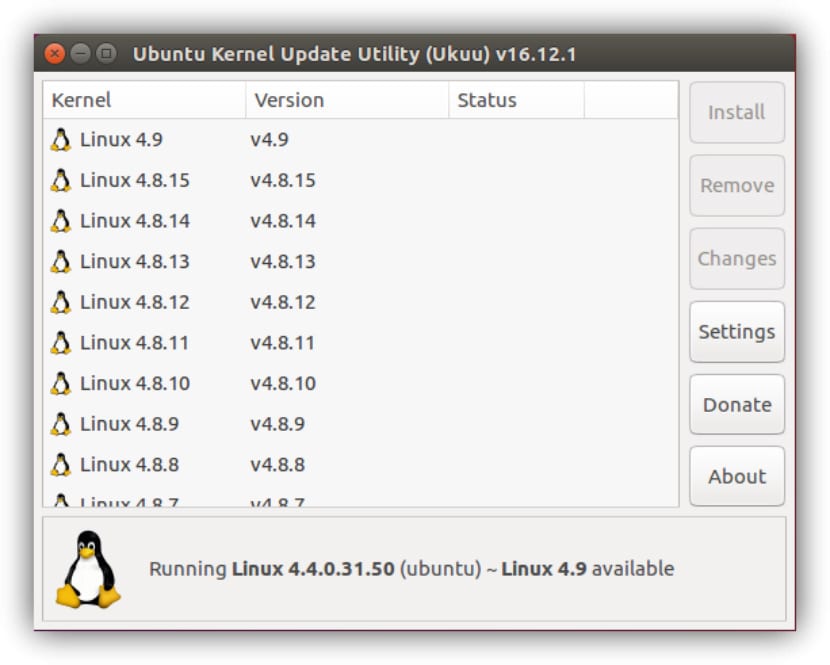
Some days ago Linux kernel update 4.18 was released with which some improvements are included and above all the resolution of some errors. So having the kernel of the system is extremely important.
For those who do not know or do not know the term "Linux Kernel" To be a bit more technical, it can be said that the kernel is the main responsible for offering the different programs with secure access to the hardware computer or basic form, it is responsible for the management of resources, through system call services.
Between the basic and general functions of a kernel, we have:
- Communication between programs that require resources and hardware.
- The management of the different computer programs (tasks) of a machine.
- Hardware management (memory, processor, peripheral, storage, etc.)
Its development is maintained thanks to the large community of developers from around the world They provide valuable lines of code from your free time or for work.
En This new update of the Linux Kernel 4.18 offers us the following improvements:
- Initial support for Qualcomm Snapdragon 845 SoC.
- Various power management improvements for AMDGPU.
- Initial support for NVIDIA GV100 Around the Nouveau DRM driver.
- Fixes for Specter V1 / V2 on 32-bit ARM.
- Support for multiple new sound chips.
- USB 3.2 upgrades and USB Type-C.
And many other changes.
How to install Linux Kernel 4.18 in Ubuntu and derivatives?
For In the special case of Ubuntu, as well as its derivatives, Canonical developers often offer updates to the Kernel already packaged in the .deb format.
With which its installation is already facilitated and above all it saves us the time of compilation and construction of this.
I should mention that the packages offered by Canonical are as generic as possible, given the large amount of hardware that exists, so if you require a more personalized version of the Kernel, I must tell you that this article is not for you.
We just have to open a terminal in the system and proceed to execute the commands corresponding to the architecture of the system we are using.
For those who are 64-bit system users should download these packages:
wget -c kernel.ubuntu.com/~kernel-ppa/mainline/v4.18/linux-headers-4.18.0-041800_4.18.0-041800.201808122131_all.deb wget -c kernel.ubuntu.com/~kernel-ppa/mainline/v4.18/linux-headers-4.18.0-041800-generic_4.18.0-041800.201808122131_amd64.deb wget -c kernel.ubuntu.com/~kernel-ppa/mainline/v4.18/linux-image-unsigned-4.18.0-041800-generic_4.18.0-041800.201808122131_amd64.deb wget -c kernel.ubuntu.com/~kernel-ppa/mainline/v4.18/linux-modules-4.18.0-041800-generic_4.18.0-041800.201808122131_amd64.deb
Now for the case of those who are 32-bit system users, the packages corresponding to their architecture are these:
wget -c kernel.ubuntu.com/~kernel-ppa/mainline/v4.18/linux-headers-4.18.0-041800_4.18.0-041800.201808122131_all.deb wget -c kernel.ubuntu.com/~kernel-ppa/mainline/v4.18/linux-headers-4.18.0-041800-generic_4.18.0-041800.201808122131_i386.deb wget -c kernel.ubuntu.com/~kernel-ppa/mainline/v4.18/linux-image-4.18.0-041800-generic_4.18.0-041800.201808122131_i386.deb wget -c kernel.ubuntu.com/~kernel-ppa/mainline/v4.18/linux-modules-4.18.0-041800-generic_4.18.0-041800.201808122131_i386.deb
Low latency packages are also availableTherefore, for users who need this type of kernel, they must download these packages.
Si 32-bit system users should download these packages:
wget -c kernel.ubuntu.com/~kernel-ppa/mainline/v4.18/linux-headers-4.18.0-041800_4.18.0-041800.201808122131_all.deb wget -c kernel.ubuntu.com/~kernel-ppa/mainline/v4.18/linux-headers-4.18.0-041800-lowlatency_4.18.0-041800.201808122131_i386.deb wget -c kernel.ubuntu.com/~kernel-ppa/mainline/v4.18/linux-image-4.18.0-041800-lowlatency_4.18.0-041800.201808122131_i386.deb wget -c kernel.ubuntu.com/~kernel-ppa/mainline/v4.18/linux-modules-4.18.0-041800-lowlatency_4.18.0-041800.201808122131_i386.deb
While for those who have 64-bit systems, you should download these packages:
wget -c kernel.ubuntu.com/~kernel-ppa/mainline/v4.18/linux-headers-4.18.0-041800_4.18.0-041800.201808122131_all.deb wget -c kernel.ubuntu.com/~kernel-ppa/mainline/v4.18/linux-headers-4.18.0-041800-lowlatency_4.18.0-041800.201808122131_amd64.deb wget -c kernel.ubuntu.com/~kernel-ppa/mainline/v4.18/linux-image-unsigned-4.18.0-041800-lowlatency_4.18.0-041800.201808122131_amd64.deb wget -c kernel.ubuntu.com/~kernel-ppa/mainline/v4.18/linux-modules-4.18.0-041800-lowlatency_4.18.0-041800.201808122131_amd64.deb
Now We just have to install the downloaded packages with the following command:
sudo dpkg -i linux-*.deb
Finally, we just have to restart our system so that when we start it again, our system runs with the new version of the Kernel that we just installed.
How to install Kernel 4.18 with Ukuu?

If you are a newbie or think that you can mess up your system by doing the above steps, you can make use of a tool that can help you simplify this kernel installation process.
I already spoke in a previous article about this Ukuu tool, which you can know and install from the link below.
It is enough to run the application on the system after having installed it and the program has the same ease of updating Kernel is very and simple.
A list of kernels is posted from the kernel.ubuntu.com site. and it shows you notifications when a new kernel update is available, and if allowed, it automatically downloads and installs the packages.
dpkg: error: cannot access file 'linux-image-4.18 * .deb': file or directory does not exist
This is the final result… and ??????
After all the downloads, the final command doesn't work…. CHECK BEFORE POSTING !!!
$ sudo dpkg -i linux-headers-4.18 * .deb linux-image-4.18 * .deb
[sudo] password for juanpablo:
dpkg: error: cannot access file 'linux-image-4.18 * .deb': file or directory does not exist
Before you must enter the directory where they have been downloaded. Usually:
cd / home / »your username» / Downloads
To know if you are in the correct directory you must do:
ls-la
If you see the kernel files you can now run the dpkg
I hope you serve.